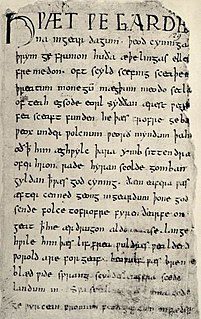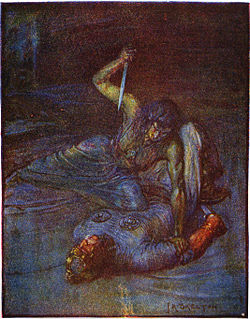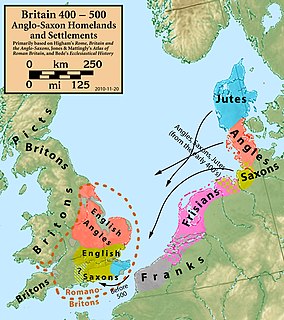Related Research Articles

Beowulf is an Old English epic poem consisting of 3,182 alliterative lines. It is one of the most important works of Old English literature. The date of composition is a matter of contention among scholars; the only certain dating pertains to the manuscript, which was produced between 975 and 1025. The anonymous poet is referred to by scholars as the "Beowulf poet".
Old English literature, or Anglo-Saxon literature, encompasses literature written in Old English, in Anglo-Saxon England from the 7th century to the decades after the Norman Conquest of 1066. "Cædmon's Hymn", composed in the 7th century, according to Bede, is often considered as the oldest surviving poem in English. Poetry written in the mid-12th century represents some of the latest post-Norman examples of Old English; for example, The Soul's Address to the Body found in Worcester Cathedral Library MS F. 174 contains only one word of possible Latinate origin, while also maintaining a corrupt alliterative meter and Old English grammar and syntax, albeit in a degenerative state. The Peterborough Chronicle can also be considered a late-period text, continuing into the 12th century. The strict adherence to the grammatical rules of Old English is largely inconsistent in 12th century work – as is evident in the works cited above – and by the 13th century the grammar and syntax of Old English had almost completely deteriorated, giving way to the much larger Middle English corpus of literature.

Grendel is a character in the Anglo-Saxon epic poem Beowulf. He is one of the poem's three antagonists, all aligned in opposition against the protagonist Beowulf. Grendel is feared by all in Heorot but Beowulf. A descendant of Cain, Grendel is described as "a creature of darkness, exiled from happiness and accursed of God, the destroyer and devourer of our human kind". He is usually depicted as a monster or a giant, although his status as a monster, giant, or other form of supernatural being is not clearly described in the poem and thus remains the subject of scholarly debate. The character of Grendel and his role in the story of Beowulf have been subject to numerous reinterpretations and re-imaginings.

In prosody, alliterative verse is a form of verse that uses alliteration as the principal ornamental device to help indicate the underlying metrical structure, as opposed to other devices such as rhyme. The most commonly studied traditions of alliterative verse are those found in the oldest literature of the Germanic languages, where scholars use the term 'alliterative poetry' rather broadly to indicate a tradition which not only shares alliteration as its primary ornament but also certain metrical characteristics. The Old English epic Beowulf, as well as most other Old English poetry, the Old High German Muspilli, the Old Saxon Heliand, the Old Norse Poetic Edda, and many Middle English poems such as Piers Plowman, Sir Gawain and the Green Knight, and the Alliterative Morte Arthur all use alliterative verse.

Heorot or Herot is a mead-hall and major point of focus in the Anglo-Saxon poem Beowulf. The hall, located in Denmark, serves as a seat of rule for King Hrothgar, a legendary Danish king. After the monster Grendel slaughters the inhabitants of the hall, the Geatish hero Beowulf defends the royal hall before subsequently defeating him. Later Grendel's mother attacks the inhabitants of the hall, and she too is subsequently defeated by Beowulf. The hall is generally held to correspond to the great hall of Lejre in Denmark found in North Germanic texts. A location of the same name receives mention in the Old English poem Widsith.

The Nowell Codex is the second of two manuscripts comprising the bound volume Cotton MS Vitellius A XV, one of the four major Anglo-Saxon poetic manuscripts. It is most famous as the manuscript containing the unique copy of the epic poem Beowulf. In addition to this, it contains first a fragment of The Life of Saint Christopher, then the more complete texts Wonders of the East and Letters of Alexander to Aristotle, and, after Beowulf, a poetic translation of Judith. Due to the fame of Beowulf, the Nowell codex is also sometimes known simply as the Beowulf manuscript. The manuscript is located within the British Library with the rest of the Cotton collection.

"Beowulf: The Monsters and the Critics" was a 1936 lecture given by J. R. R. Tolkien on literary criticism on the Old English heroic epic poem Beowulf. It was first published as a paper in that year in the Proceedings of the British Academy, and has since been reprinted in many collections.

Grendel's mother is one of three antagonists in the anonymous Old English poem Beowulf. The other antagonists are Grendel and the dragon, all aligned in opposition to the hero Beowulf. She is introduced in lines 1258b to 1259a as: "Grendles modor/ides, aglæcwif".

"On Translating Beowulf" is an essay by J. R. R. Tolkien which discusses the difficulties faced by anyone attempting to translate the Old English heroic-elegiac poem Beowulf into modern English. It was first published in 1940 as a preface contributed by Tolkien to a translation of Old English poetry; it was first published as an essay under its current name in the 1983 collection The Monsters and the Critics, and Other Essays.

The Battle of Finnsburg was a conflict in the Germanic heroic age between Frisians with a possible Jutish contingent, and a primarily Danish party. Described only in later Anglo-Saxon poetry, if the conflict had an historical basis it most likely occurred around 450 AD.

Exodus is the title given to an Old English alliterative poem in the Junius manuscript. Exodus is not a paraphrase of the biblical book, but rather a re-telling of the story of the Israelites' flight from Egyptian captivity and the Crossing of the Red Sea in the manner of a "heroic epic", much like Old English poems Andreas, Judith, or even Beowulf. It is one of the densest, most allusive and complex poems in Old English, and is the focus of much critical debate.

The 17th act of the Anglo-Saxon poem Beowulf includes Beowulf's fight with a dragon, the third monster he encounters in the epic. On his return from Heorot, where he killed Grendel and Grendel's mother, Beowulf becomes king of the Geats and rules wisely for fifty years until a slave awakens and angers a dragon by stealing a jeweled cup from its lair. When the angry dragon mercilessly burns the Geats' homes and lands, Beowulf decides to fight and kill the monster personally. He and his thanes climb to the dragon's lair where, upon seeing the beast, the thanes flee in terror, leaving only Wiglaf to battle at Beowulf's side. When the dragon wounds Beowulf fatally, Wiglaf slays it.
The "Finnesburg Fragment" is a portion of an Old English heroic poem about a fight in which Hnæf and his 60 retainers are besieged at "Finn's fort" and attempt to hold off their attackers. The surviving text is tantalisingly brief and allusive, but comparison with other references in Old English poetry, notably Beowulf, suggests that it deals with a conflict between Danes and Frisians in Migration-Age Frisia.
The "Battle of Brunanburh" is an Old English poem. It is preserved in the Anglo-Saxon Chronicle, a historical record of events in Anglo-Saxon England which was kept from the late ninth to the mid-twelfth century. The poem records the Battle of Brunanburh, a battle fought in 937 between an English army and a combined army of Scots, Vikings, and Britons. The battle resulted in an English victory, celebrated by the poem in style and language like that of traditional Old English battle poetry. The poem is notable because of those traditional elements and has been praised for its authentic tone, but it is also remarkable for its fiercely nationalistic tone, which documents the development of a unified England ruled by the House of Wessex.

Hatton Gospels is the name now given to a manuscript produced in the late 12th century or early 13th century. It contains a translation of the four gospels into the West Saxon dialect of Old English. It is a nearly complete gospel book, missing only a small part of the Gospel of Luke. It is now in the Bodleian Library, Oxford, as MS Hatton 38.
Nicholas Howe (1953–2006) was an American scholar of Old English literature and culture, whose Migration and Mythmaking in Anglo-Saxon England (1989) was an important contribution to the study of Old English literature and historiography.
Stephen O. Glosecki was a scholar of Old English language and literature. Glosecki was raised in Springfield, Illinois, and educated at Sacred Heart-Griffin High School. He received his undergraduate degree from Beloit College, and his Master's and Ph.D. degrees from University of California, Davis. A professor of Old English at University of Alabama at Birmingham, he was the author of books and articles on Old English literature, particularly on shamanism and folklore, and was notable for his contributions to the anthropological study of early Germanic literature. He died of cancer in 2007, aged 55. A collection he edited, Myth in Early Northwest Europe, was published posthumously; his introduction was called "lively and, in places, poetic", and his translations of some of the Anglo-Saxon metrical charms were praised as "fluent, vigorous".
John Richard Clark Hall was an English scholar of Old English, and a barrister. In his professional life, Hall worked as a clerk at the Local Government Board in Whitehall; admitted to Gray's Inn in 1881 and called to the bar in 1896, Hall became principal clerk two years later. During the same period Hall published a dictionary of Old English, and multiple translations of the Anglo-Saxon poem Beowulf.
Marijane Osborn is an American academic. Her research spans literary disciplines, she is a specialist in Old English and Norse literature, and she has published on runes, Middle English, Victorian and contemporary poets and writers, film, and is a translator and fiction writer. She is Professor Emerita at UC Davis.
References
- ↑ Magennis, Hugh (2011). The Cambridge Introduction to Anglo-Saxon Literature. Cambridge UP. p. 192. ISBN 9780521519472.
- ↑ Chickering, Howell (2002). "Beowulf and 'Heaneywulf'". The Kenyon Review . 24 (1): 160–78. JSTOR 4338314.
- ↑ Trilling, Renée Rebecca (2009). The Aesthetics of Nostalgia: Historical Representation in Old English Verse. U of Toronto P. p. 9. ISBN 9780802099716.
- ↑ Foot, Sarah (2011). AEthelstan. Yale UP. p. 1. ISBN 9780300160376.
